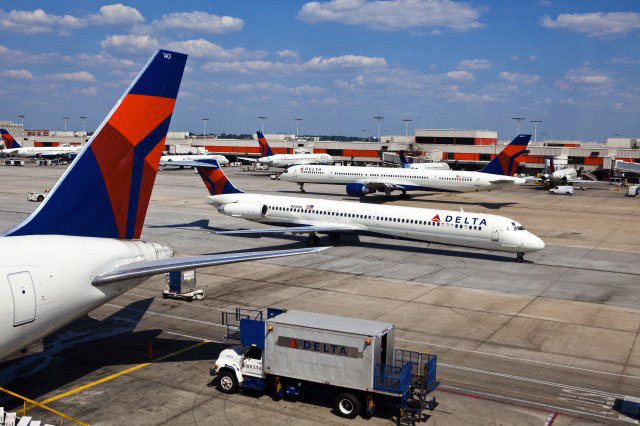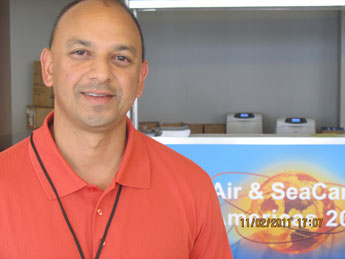

 This
story should be framed with some words from Great Expectations. This
story should be framed with some words from Great Expectations.
That Dickens title can stand for the
credo of one Neel Shah and his band of air cargo brothers (and sisters)
down Atlanta way, in Georgia, USA.
“I return to this young fellow.
And the communication I have got to make is, that he has great expectations."
Neel certainly has “great expectations,”
so determined is he to take Delta Cargo where it has never been before—as
a billion dollar air cargo enterprise.
Wherever he travels and whatever he
does, there is always constant contact on the cell phone, mini-conferences
on the go, and event-driven decision making, along with a grand plan
that adds up to total immersion in what it takes to lift DL Cargo.
“We are taking cargo up where
it belongs.”
When it comes to IATA World Cargo Symposium,
Shah is resolute in his expectations. “We look to this event
to drive dialogue and consensus around key issues in our industry,
such as e-Freight, regulatory mandates like the EU carbon emissions
scheme and most importantly the looming 100 percent inbound security
mandate.
“From my view, the most important
outcome from these types of industry events is that we come away focused
on advancing and promoting the critical issues our industry faces
with a unified voice,” said Shah.
Coming off of 2011, at the end of which Delta faced “significant
headwinds” and “softening volumes in the fourth quarter,”
Shah believes Delta Cargo is off to a good, strong start in 2012.
“Delta Cargo has been able to deliver on our sales objectives
outperforming the cumulative A4A competitors in both revenue and volume
in January.
“As a company, Delta is also committed
to maintaining capacity discipline, with a 4 percent year over year
reduction in January, so we are essentially doing more with less.
Capacity discipline is critical for our industry right now and Delta
is showing a great deal of restraint in this area,” said Shah.
As for the rest of the year, Delta has
still seen volume pressure—due, in part, to the Chinese New
Year. “US GDP grew at 4 percent in Q4, up from a 1.8 percent
growth rate in Q3; Consumer Confidence is at an 11-month high and
the U.S. Inventories to Sales ratio is lowering, indicating the need
for inventory replenishment,” said Shah. As the US does better
in general, with more jobs available and the unemployment rate dropping,
consumer confidence is again finding an upswing.
“We believe that there are some
good fundamentals working in the market right now, but ultimately
our success this year will be dependent upon exceeding our customers’
expectations operationally, enhancing our product offering and executing
a well-defined sales strategy.
“We are off to a decent start
but we still have a great deal of work to do before we are satisfied,”
said Shah.
One area in which Delta is performing
splendidly, Shah says, is in mail, which has shown very strong year-on-year
growth rates. Shah believes that by the year 2014, the USPS will be
Delta’s largest customer. Organizational
changes within the USPS are driving more of their product into commercial
air carrier service. In addition to the USPS, Delta is also looking
to Latin America.
“We believe that the Latin market
presents a lot of opportunity due to Delta’s strong network
positioning and promising yield trends in the region. We are also
focusing our growth efforts in key product lines, such as Pharma and
our NFO product in the US domestic market,” said Shah.
“Delta Cargo is focused on investing
in the business from all sides – infrastructure, technology
and people.
“We have invested in our scanning
capabilities, as well as state of the art screening equipment. We
have been an industry leader with respect to e-Freight adoption (domestic
will be at 20 percent by March and international at 5 percent by June)
and have our sights set on achieving top tier performance in Cargo
2000 industry rankings, which is very hard work.
Delta is also paying special attention
to new technology initiatives. “In January, we announced an
exclusive marketing agreement with OnAssett Intelligence, a leading
provider of machine-to-machine (M2M) wireless asset tracking solutions,
enabling Delta Cargo customers to view GPS location information on
deltacargo.com.
“We were the first airline to
receive FAA approval for the Sentry 400 FlightSafe device on all Mainline
and Connection flights, and we believe that offering GPS customers
our complete network and combining active and passive tracking data
into a single location will be a considerable advantage for their
critical shipment needs,” said Shah. He also assures us that
www.deltacargo.com will be undergoing changes to improve functionality
and ease of use.
“Delta Cargo is also focused on
developing and expanding key product offerings in niche markets, such
as Pharma and DASH lifeguard for critical express shipments. These
shipments require specialized service and a high degree of visibility,
and our investments in process and technology position us very well
in these markets,” said Shah.
Shah is also looking forward to the
Delta Cargo frontline team operating as one family, now that all of
Delta’s labor representation issues are in order.
“The process began with immediate
alignment of pay and benefits in December, followed by full participation
in corporate profit sharing on February 14th and will continue with
company-wide pay increases on July 1st.
“On March 1st, we implemented
an incentive program for our Cargo operations and customer service
center employees in North America to recognize and reward participants
based upon achievement of key performance goals which are important
to our customers,” said Shah.
Looking forward further, there is much
to be excited about for IATA in the fall, and Delta is certainly up
to the task.
“As the hometown airline, we are
thrilled to host TIACA in Atlanta. Delta Cargo will be an active member
in the event and along with our hosting partners, Metro Atlanta Chamber,
Hartsfield-Jackson Atlanta International Airport and UPS.”
Hosting the event, Shah said, “gives
us the opportunity to highlight our industry-leading network, which
serves over 200 destinations in 43 countries non-stop from Atlanta,
and showcases Atlanta as a true gateway.
“Many delegates will also get
to experience firsthand the new international terminal at Hartsfield
Jackson, which opens this spring. Our network combined with the new
terminal positions Delta for even greater growth and success in the
international market both from a passenger and cargo perspective.
Shah believes IATA is the perfect event that gives the cargo community
the opportunity to see the investments Delta has made in operations,
improving scanning capabilities, new screening equipment and the growth
of the perishable center.
As for air cargo security, Shah believes
that there have many accomplishments, especially in “increased
government collaboration with industry,” but there is still
much that needs to be done. He believes “international harmonization”
is key to the success of security and that governments need to synch
up their standards.
“The level of collaboration between
the Department of Homeland Security (DHS) and industry is at an unprecedented
level and we need to take advantage of this very constructive dialogue
in order to help shape the regulation that will govern our industry
going forward.
“The ACAS pilot is an area where
the government is begging the industry to participate, yet only a
handful of companies have stepped up to the plate.
“This is really shameful and I
need to ask all of the companies who rely on the air cargo industry
to fuel their bottom lines to step up to the plate and begin participating.
“If you don’t participate,
then you have no right to complain once the regulation becomes law.
Make no mistake that we will be required to be at 100 percent by the
end of 2012 and there will be no extension to this date.”
Everyone in the cargo industry is hoping
that GACAG will have a positive influence on harmonization, and Shah
is no different in his expectations for the group.
“I believe GACAG is tackling the
key issues in our industry and beginning to make a real and lasting
impact.
“To actually effect change, it
will be important for the group to stay focused on a few of the core
issues and ensure they maintain a representative position. Collaborative
advocacy is a very good thing and will definitely benefit the industry,
especially in the regulatory arena,” Neel Shah said.
Geoffrey Arend
|



